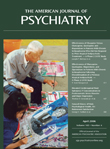The Psychotherapy of Sexually Impulsive Patients
To the Editor:
The therapy described by Glen O. Gabbard, M.D., and Tanya J. Bennett, M.D. (1) , in their interesting article appears incomplete. The case conference ended with the patient no longer engaging in the dangerous sexual behaviors demanded by her husband and finding satisfaction in a new career, although she also appeared to be resigned to continuing her loveless, sexless, and childless marriage.
The authors clearly elucidated that the patient’s masochistic compliance with her husband’s demands reproduced the patterns of behavior established with the patient’s mother, and it may well be that the patient’s maintaining of her marriage at this level of dissatisfaction was the result of the patient’s masochistic compliance with her perceived demands of the therapist, i.e., that the patient give up her previous lifestyle.
Actively interpreting to the patient that she may be responding to the therapist in ways similar to her interactions with her mother and husband (the triangle of insight [2] ) may allow the patient to be more experientially aware of her repetitive pattern of maladaptive behaviors, hopefully leading to change and a fuller and more satisfactory life.
1. Gabbard GO, Bennett TJ: Dilemmas in the psychotherapy of sexually impulsive patients (clin case conf). Am J Psychiatry 2005; 162:859–865Google Scholar
2. Menninger K: Theory of Psychoanalytic Technique. New York, Basic Books, 1958Google Scholar



